The average cost of Intensity-modulated radiotherapy (IMRT) in South Africa starts from USD 15000
Radiation treatment is a kind of cancer growth treatment that utilizes light emissions energy to eliminate diseased cells. Radiation treatment frequently uses X-beams, yet protons or different sorts of energy likewise can be utilized.
The expression "radiation therapy" regularly alludes to external beam radiation treatment. During this kind of radiation, the high-energy beams originate from a machine outside of your body that points the bars at an exact point on your body. During an alternate kind of radiation treatment called brachytherapy (brak-e-THER-uh-pee), radiation is put inside your body.
Radiation treatment harms cells by wrecking the genetic material that controls how cells develop and separate. While both healthy and carcinogenic cells are harmed by radiation treatment, the objective of radiation treatment is to annihilate as not many typical, normal cells as could reasonably be expected. Typical cells can regularly fix a significant part of the harm brought about by radiation.
There are various symptoms that crop up both short term and long term. The short term may include:
Fatigue
Hair loss
Diarrhea
Skin changes
Nausea and vomiting
Heart or lung problems, if radiation affects the chest
Thyroid problems, leading to hormonal changes, if radiation affects the neck area
Lymphedema, which involves lymph fluid building up and causing pain
Hormonal changes, including a possibility of early menopause, from radiation in the pelvic area
There is a slight chance that high doses of radiation in certain areas can increase the risk of another form of cancer developing. A doctor will provide more specific information and help with weighing the risks and benefits.
There can be several factors affecting the costing of the procedure and the entire billing. Few of them depend on the current medical status of the patient and others are just hygiene.
Age of the patient
Stage of cancerous growth in the patient
The spending capacity of the patient
Technology and resources used for the treatment process
Treatment cost
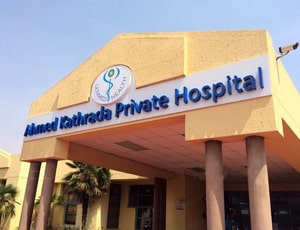
Apart from in-detail treatment procedures available, Lenmed Ahmed Kathrada Private Hospital located in Johannesburg, South Africa has a wide variety of facilities available for International Patients. Some of the facilities which are provided by them are Accommodation, Airport Transfer, Choice of Meals, Interpreter, SIM, TV inside room. Also listed below are some of the most prominent infrastructural details:

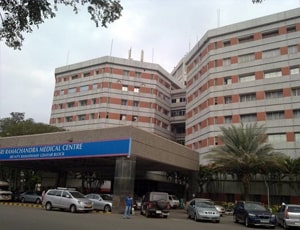
Types of Intensity-modulated radiotherapy (IMRT) in Sri Ramachandra Medical Centre and its associated cost
| Treatment Option | Approximate Cost Range (USD) | Approximate Cost Range (INR) |
|---|---|---|
| IMRT (Overall) | 4545 - 8090 | 372993 - 666601 |
| Head and Neck IMRT | 3537 - 7096 | 292541 - 584893 |
| Breast IMRT | 2341 - 6584 | 191961 - 541419 |
| Prostate IMRT | 3873 - 7105 | 316024 - 583569 |
| Abdominal IMRT | 2538 - 6875 | 208565 - 568336 |
| Pelvic IMRT | 2530 - 6887 | 207090 - 563726 |
| Spine IMRT | 2855 - 8144 | 233163 - 666928 |
| Brain IMRT | 2528 - 6915 | 207924 - 565408 |
| Lung IMRT | 2834 - 8116 | 233510 - 665016 |
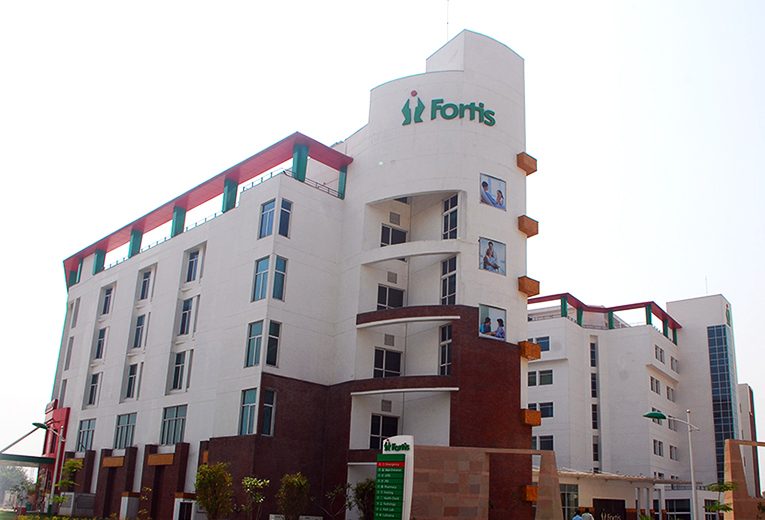
Fortis Hospital, Shalimar Bagh is a super-speciality hospital which occupies a unique place when it comes to providing world class patient care. The hospital is equipped with 262 beds and is expanded over a total area of 7.34 acres. It provides the highest quality of medical care via its team of doctors, technicians, nurses, and management professionals.
Infrastructure & facilities:
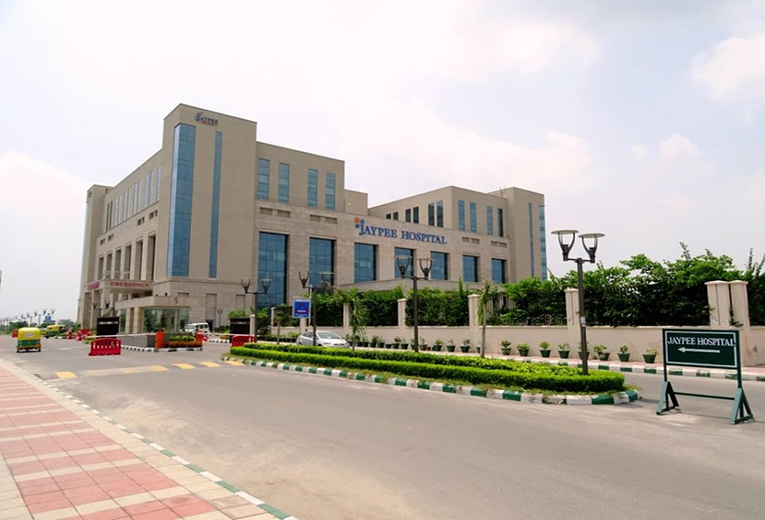
Jaypee Hospital located in Noida, India is accredited by ISO, NABH, NABL. Also listed below are some of the most prominent infrastructural details:
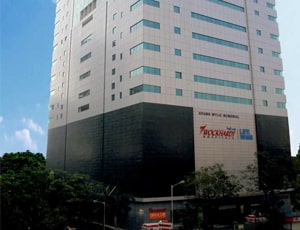
Types of Intensity-modulated radiotherapy (IMRT) in Wockhardt Hospital - A New Age Hospital and its associated cost
| Treatment Option | Approximate Cost Range (USD) | Approximate Cost Range (INR) |
|---|---|---|
| IMRT (Overall) | 4557 - 8085 | 374652 - 667978 |
| Head and Neck IMRT | 3557 - 7139 | 292289 - 580529 |
| Breast IMRT | 2326 - 6599 | 192144 - 538699 |
| Prostate IMRT | 3868 - 7085 | 316475 - 580709 |
| Abdominal IMRT | 2535 - 6886 | 207612 - 564670 |
| Pelvic IMRT | 2530 - 6915 | 207373 - 568081 |
| Spine IMRT | 2832 - 8150 | 233164 - 662991 |
| Brain IMRT | 2539 - 6934 | 209055 - 565007 |
| Lung IMRT | 2845 - 8101 | 233308 - 666735 |
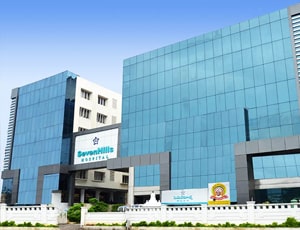
Types of Intensity-modulated radiotherapy (IMRT) in Seven Hills Hospital and its associated cost
| Treatment Option | Approximate Cost Range (USD) | Approximate Cost Range (INR) |
|---|---|---|
| IMRT (Overall) | 5114 - 8881 | 421725 - 724362 |
| Head and Neck IMRT | 4018 - 7793 | 323940 - 655921 |
| Breast IMRT | 2644 - 7233 | 211659 - 607977 |
| Prostate IMRT | 4332 - 8031 | 348110 - 632383 |
| Abdominal IMRT | 2826 - 7810 | 227602 - 627874 |
| Pelvic IMRT | 2790 - 7532 | 232147 - 638003 |
| Spine IMRT | 3088 - 8802 | 263762 - 750418 |
| Brain IMRT | 2841 - 7768 | 232340 - 613705 |
| Lung IMRT | 3134 - 9137 | 263655 - 728308 |
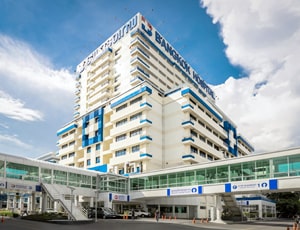
Types of Intensity-modulated radiotherapy (IMRT) in Bangkok Hospital and its associated cost
| Treatment Option | Approximate Cost Range (USD) | Approximate Cost Range (THB) |
|---|---|---|
| IMRT (Overall) | 5703 - 16909 | 198444 - 609378 |
| Head and Neck IMRT | 5495 - 10319 | 188951 - 355804 |
| Breast IMRT | 5142 - 8822 | 183973 - 315821 |
| Prostate IMRT | 5388 - 11307 | 191057 - 403369 |
| Abdominal IMRT | 5114 - 10306 | 179012 - 357461 |
| Pelvic IMRT | 5080 - 10181 | 178117 - 365881 |
| Spine IMRT | 5355 - 11216 | 189985 - 407781 |
| Brain IMRT | 4997 - 7829 | 182813 - 279015 |
| Lung IMRT | 5420 - 11181 | 191513 - 398104 |
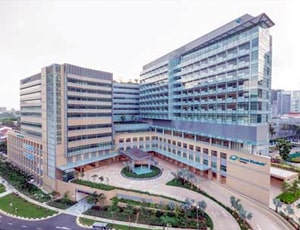
Mount Elizabeth Novena Hospital located in Novena, Singapore is accredited by JCI. Also listed below are some of the most prominent infrastructural details:
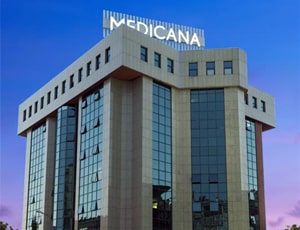
Types of Intensity-modulated radiotherapy (IMRT) in Medicana Camlica Hospital and its associated cost
| Treatment Option | Approximate Cost Range (USD) | Approximate Cost Range (TRY) |
|---|---|---|
| IMRT (Overall) | 2038 - 6639 | 61419 - 205773 |
| Head and Neck IMRT | 2046 - 5563 | 62372 - 172428 |
| Breast IMRT | 1699 - 5116 | 51586 - 151651 |
| Prostate IMRT | 2209 - 5526 | 67140 - 170861 |
| Abdominal IMRT | 2032 - 4973 | 59698 - 155074 |
| Pelvic IMRT | 1999 - 5048 | 61157 - 153744 |
| Spine IMRT | 2282 - 5651 | 67788 - 169955 |
| Brain IMRT | 2032 - 5088 | 61360 - 154615 |
| Lung IMRT | 2226 - 6244 | 67763 - 184984 |
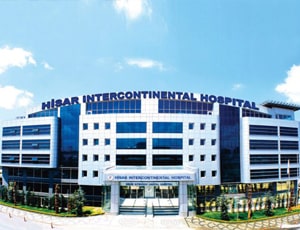
Types of Intensity-modulated radiotherapy (IMRT) in Hisar Intercontinental Hospital and its associated cost
| Treatment Option | Approximate Cost Range (USD) | Approximate Cost Range (TRY) |
|---|---|---|
| IMRT (Overall) | 2019 - 6667 | 60475 - 205854 |
| Head and Neck IMRT | 2039 - 5709 | 61928 - 171760 |
| Breast IMRT | 1686 - 5023 | 50701 - 150740 |
| Prostate IMRT | 2206 - 5591 | 68684 - 166634 |
| Abdominal IMRT | 2054 - 5066 | 59789 - 152721 |
| Pelvic IMRT | 1985 - 5003 | 61164 - 150736 |
| Spine IMRT | 2204 - 5524 | 68943 - 171322 |
| Brain IMRT | 2055 - 5093 | 61210 - 155592 |
| Lung IMRT | 2255 - 6108 | 67415 - 186614 |
DOCTORS IN 12 SPECIALITIES
FACILITIES & AMENITIES
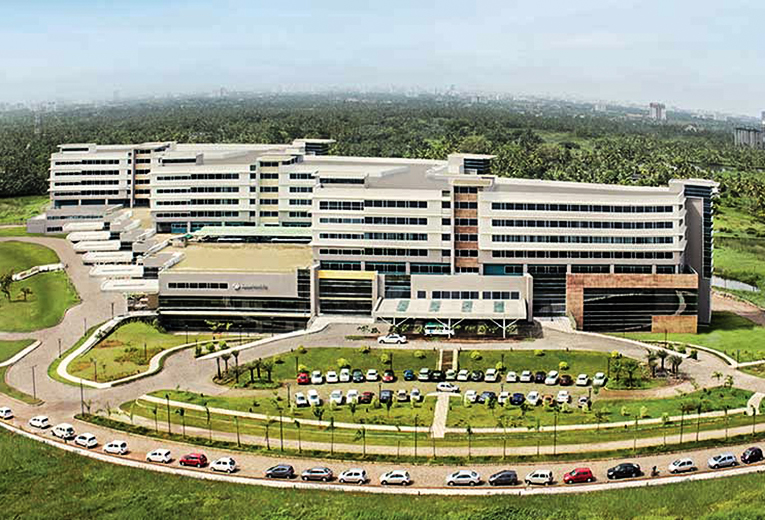
Types of Intensity-modulated radiotherapy (IMRT) in Aster Medcity and its associated cost
| Treatment Option | Approximate Cost Range (USD) | Approximate Cost Range (INR) |
|---|---|---|
| IMRT (Overall) | 4550 - 8094 | 373776 - 667912 |
| Head and Neck IMRT | 3551 - 7126 | 291765 - 583772 |
| Breast IMRT | 2341 - 6626 | 190493 - 541618 |
| Prostate IMRT | 3867 - 7112 | 316654 - 584075 |
| Abdominal IMRT | 2540 - 6913 | 207540 - 564508 |
| Pelvic IMRT | 2530 - 6904 | 208476 - 564951 |
| Spine IMRT | 2841 - 8105 | 233378 - 668551 |
| Brain IMRT | 2530 - 6881 | 208312 - 567550 |
| Lung IMRT | 2840 - 8097 | 231984 - 666482 |
Types of Intensity-modulated radiotherapy (IMRT) in Pushpawati Singhania Research Institute and its associated cost
| Treatment Option | Approximate Cost Range (USD) | Approximate Cost Range (INR) |
|---|---|---|
| IMRT (Overall) | 4560 - 8129 | 374641 - 663934 |
| Head and Neck IMRT | 3551 - 7080 | 290912 - 580416 |
| Breast IMRT | 2344 - 6620 | 191112 - 543355 |
| Prostate IMRT | 3852 - 7098 | 315810 - 584592 |
| Abdominal IMRT | 2536 - 6926 | 208522 - 567436 |
| Pelvic IMRT | 2531 - 6898 | 207540 - 566368 |
| Spine IMRT | 2830 - 8088 | 233967 - 663507 |
| Brain IMRT | 2542 - 6905 | 207376 - 567842 |
| Lung IMRT | 2838 - 8081 | 234157 - 668000 |
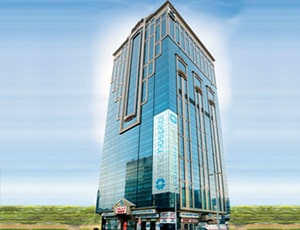
Types of Intensity-modulated radiotherapy (IMRT) in NMC Specialty Hospital and its associated cost
| Treatment Option | Approximate Cost Range (USD) | Approximate Cost Range (AED) |
|---|---|---|
| IMRT (Overall) | 9168 - 39040 | 32568 - 146026 |
| Head and Neck IMRT | 8275 - 13238 | 31620 - 48555 |
| Breast IMRT | 7708 - 12232 | 28868 - 44771 |
| Prostate IMRT | 8510 - 14728 | 30321 - 53075 |
| Abdominal IMRT | 7859 - 12203 | 29112 - 45993 |
| Pelvic IMRT | 8014 - 12470 | 28531 - 45231 |
| Spine IMRT | 8257 - 14866 | 30860 - 54512 |
| Brain IMRT | 8019 - 10242 | 28436 - 37469 |
| Lung IMRT | 8584 - 14869 | 31388 - 52640 |
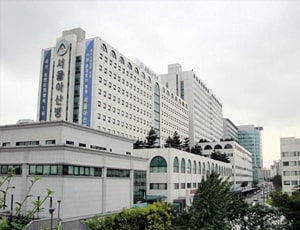
Asan Medical Centre located in Seoul, South Korea is accredited by ISO. Also listed below are some of the most prominent infrastructural details:
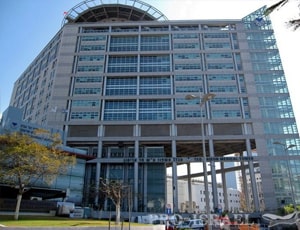
Tel Aviv Sourasky Medical Center -Ichilov Hospital located in Tel-Aviv, Israel is accredited by JCI. Also listed below are some of the most prominent infrastructural details:
Intensity-modulated radiation therapy (IMRT) stands as an advanced form of radiation therapy in cancer treatment. By utilizing potent energy beams—derived from X-rays, protons, or alternative sources—IMRT precisely targets cancer cells, sparing healthy tissue.
IMRT employs customized radiation beams, meticulously tailored to match the contours of the cancerous area. These beams possess the flexibility to move along arcs during treatment delivery, allowing for optimal coverage. Additionally, the intensity of each beam can be finely adjusted, ensuring accurate radiation dosage.
This technique enables the safe and efficient delivery of radiation therapy, minimizing damage to surrounding healthy tissues. IMRT's versatility extends to the treatment of both cancerous and benign tumors across various body regions, with the primary objective being to administer the appropriate radiation dose to the target while mitigating collateral damage.
The following types of cancer can be treated by IMRT:
The duration of recovery varies based on several factors such as radiation dosage, treatment frequency, and the specific body part receiving radiation. While some individuals may experience relief from side effects within a few weeks, others may require a month or two to feel better.
Ask your healthcare adviser for the best multiple options and choose the one that meets your expectations
The cost of Intensity-modulated radiotherapy (IMRT) procedure starts from USD 15000 in South Africa. In South Africa, Intensity-modulated radiotherapy (IMRT) is conducted across many multispecialty hospitals.
The Intensity-modulated radiotherapy (IMRT) package cost in South Africa varies from one hospital to another and may offer different benefits. Some of the best hospitals for Intensity-modulated radiotherapy (IMRT) offer a comprehensive package that covers the end-to-end expenses related to investigations and treatment of the patient. Typically, the package cost of Intensity-modulated radiotherapy (IMRT) in South Africa includes the expenses related to the surgeon's fee, anesthesia, hospital, meals, nursing and ICU stay. Extended hospital stay, complications after the surgery or new diagnosis may affect the overall cost of Intensity-modulated radiotherapy (IMRT) in South Africa.
There are many hospitals across the country that offer Intensity-modulated radiotherapy (IMRT) to international patients. Some of the most renowned hospitals for Intensity-modulated radiotherapy (IMRT) in South Africa include the following:
While the speed of recovery may vary from patient to patient, they are still required to stay for about 30 days after discharge. During this time, the patient undergoes medical tests and consultations. this is to ensure that the treatment was successful and the patient us safe to return.
Apart from the Intensity-modulated radiotherapy (IMRT) cost, the patient may have to pay for additional daily expenses such as for guest house after discharge and meals. The extra charges may start from USD 50 per person.
Intensity-modulated radiotherapy (IMRT) in South Africa is offered in almost all metropolitan cities, including the following:
After the Intensity-modulated radiotherapy (IMRT) takes place, the average duration of stay at the hospital is about 1 day. The doctors team review the patient's recovery during this time with the help of blood tests and imaging scans. Once they feel that everything is on track, the patient is discharged.
The average rating for Intensity-modulated radiotherapy (IMRT) hospitals in South Africa is 2.9. This rating is automatically calculated on the basis of several parameters such as the infrastructure of the hospital, quality of services, nursing support and other services.
There are more than 1 hospitals that offer Intensity-modulated radiotherapy (IMRT) in South Africa. These clinics have proper infrastructure for the treatment of patients who require kidney transplant. Also, these hospitals follow the necessary guidelines as required by the medical associations for the treatment of Intensity-modulated radiotherapy (IMRT) patients.
Some of the best medical specialists for Intensity-modulated radiotherapy (IMRT) in South Africa are: